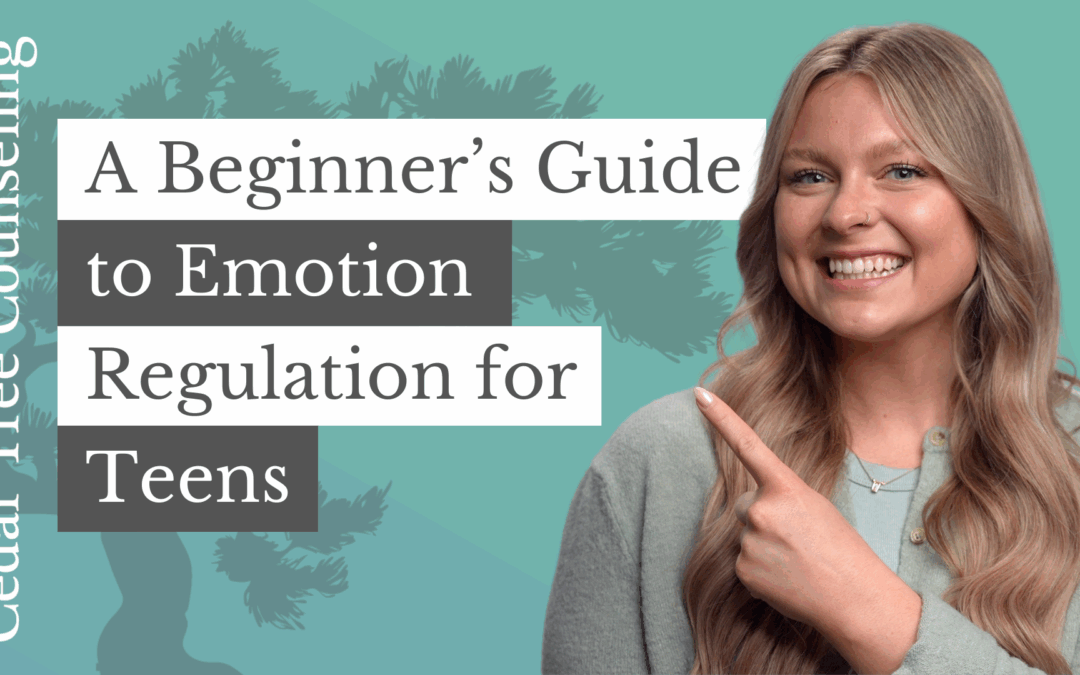Have you ever felt like your emotions take over before you even have a chance to think? One moment you’re fine, and the next you’re slamming doors, shutting down, or spiraling into anxiety.
It’s confusing. It’s exhausting. And it can feel like something is wrong with you.
If you’re a teen, or a parent of one, you need to know this: intense emotions are a normal part of adolescent development. The teen brain is still learning how to regulate, and that process can be messy. But with the right tools and support, it is possible to feel more in control.
Hi, I’m Grace Anderson, an Associate Licensed Marriage and Family Therapist at Cedar Tree Counseling. I help teens learn how to understand their emotions, rather than be overwhelmed by them.
Today, I want to give you a simple, beginner-friendly guide to managing emotions in a healthier way.
1. Start With the Breath
For example, let’s say you just got a text from a friend that felt like a rejection. Your emotions start rising fast, your heart’s racing, your fists are clenched, or you feel like yelling or crying.
That’s your body sounding the alarm. But you’re not actually in danger. You’re just emotionally overwhelmed.
Try this exercise:
- Breathe in through your nose for 4 seconds
- Hold that breath for 4 seconds
- Then slowly exhale through your mouth for 4 seconds
- Hold again for 4 seconds
- Repeat it three to five times
Your breath is like an internal reset button, and using it effectively tells your brain and body you’re safe.
2. Name What You’re Feeling
Emotions are a part of us, and they demand space. They also lose power when we name them. Saying ‘I’m angry’ is a good start, but getting more specific can help you understand what’s really going on.
Instead of ‘I’m mad,’ what if it’s:
- ‘I feel left out because no one invited me.’
- ‘I’m embarrassed because I got called out in class.’ or
- ‘I’m overwhelmed because my schedule is packed.’
When we name the emotion, it gives our brain a framework to work with. The more words you have for what you feel, the more control you gain.
3. Know Your Triggers & Own Your Response
Everyone has emotional triggers: those moments, phrases, or experiences that light a fire in us. For some, it’s being ignored. For others, it’s being told what to do. Understanding your own triggers gives you a chance to choose how you respond instead of reacting on autopilot.
For example, if you know that being corrected in front of others triggers shame or defensiveness, you can start noticing it in the moment.
Then you can say to yourself, ‘I’m feeling triggered, but I can choose how I respond.’
Ownership means recognizing that even if someone hurt you, you’re still responsible for how you act next.
Emotion regulation isn’t about being perfect. It’s about learning how to stay grounded, name what’s happening, and respond instead of react.
These are skills. And just like learning an instrument or sport, they get stronger with practice.
If your teen is struggling with anger, anxiety, or emotional overwhelm, don’t hesitate to schedule an appointment with us today. At Cedar Tree Counseling, we create a safe, compassionate space for teens to grow and heal.

Grace Anderson
Children, Teens, Women, & Families
I strive to create an authentic, encouraging space where your child can explore their emotions, build self-awareness, and develop healthy ways to cope.
Choose A Topic!
Cedar Tree's Mission:
There are a lot of broken families who struggle to do life well together.
That’s why we help families create an environment where deeper connection & healing can happen.


